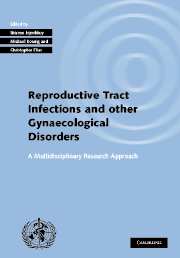 Investigating Reproductive Tract Infections and Other Gynaecological Disorders
Investigating Reproductive Tract Infections and Other Gynaecological Disorders Book contents
- Frontmatter
- Contents
- List of contributors
- Foreword by Paul F.A. Van Look
- Acknowledgements
- 1 Introduction and overview
- 2 Defining reproductive tract infections and other gynaecological morbidities
- 3 The social context of gynaecological morbidity: correlates, consequences and health seeking behaviour
- 4 Reproductive health: men's roles and men's rights
- 5 Study design for the measurement of gynaecological morbidity
- 6 Alternatives to community-based study designs for research on women's gynaecological morbidity
- 7 Community interaction in studies of gynaecological morbidity: experiences in Egypt, India and Uganda
- 8 Definitions of clinically diagnosed gynaecological morbidity resulting from reproductive tract infection
- 9 Laboratory tests for the detection of reproductive tract infections
- 10 Laboratory methods for the diagnosis of reproductive tract infections and selected conditions in population-based studies
- 11 The value of the imperfect: the contribution of interview surveys to the study of gynaecological ill health
- 12 Qualitative methods in gynaecological morbidity research
- 13 Integrating qualitative and quantitative methods in research on reproductive health
- 14 Interpreting results from different sources of data
- 15 Turning research into action
- Appendix A Notes on contributors
- Index
6 - Alternatives to community-based study designs for research on women's gynaecological morbidity
Published online by Cambridge University Press: 07 December 2009
- Frontmatter
- Contents
- List of contributors
- Foreword by Paul F.A. Van Look
- Acknowledgements
- 1 Introduction and overview
- 2 Defining reproductive tract infections and other gynaecological morbidities
- 3 The social context of gynaecological morbidity: correlates, consequences and health seeking behaviour
- 4 Reproductive health: men's roles and men's rights
- 5 Study design for the measurement of gynaecological morbidity
- 6 Alternatives to community-based study designs for research on women's gynaecological morbidity
- 7 Community interaction in studies of gynaecological morbidity: experiences in Egypt, India and Uganda
- 8 Definitions of clinically diagnosed gynaecological morbidity resulting from reproductive tract infection
- 9 Laboratory tests for the detection of reproductive tract infections
- 10 Laboratory methods for the diagnosis of reproductive tract infections and selected conditions in population-based studies
- 11 The value of the imperfect: the contribution of interview surveys to the study of gynaecological ill health
- 12 Qualitative methods in gynaecological morbidity research
- 13 Integrating qualitative and quantitative methods in research on reproductive health
- 14 Interpreting results from different sources of data
- 15 Turning research into action
- Appendix A Notes on contributors
- Index
Summary
Since 1990, the issue of women's gynaecological morbidity has received increasing attention and priority from health policy makers and programme managers in many developing countries. Although recognized by women's health advocates as an important public health and gender issue more than a decade ago (DixonMueller and Wasserheit, 1991), findings from carefully designed, community based research studies have played a critical role in drawing wider attention to the issue of gynaecological morbidity in developing countries. Published studies in India, Egypt, Nigeria, Tanzania, Uganda and China have effectively highlighted the magnitude and scope of sexually transmitted infections (STIs) (Mosha et al., 1993; Wawer et al., 1998), and of gynaecological morbidity more broadly (Bang et al., 1989; Bhatia et al., 1997; Brabin et al., 1995; Kaufman et al., 1999; Younis et al., 1993), among women in developing countries.
Community-based gynaecological morbidity studies have served as important tools for epidemiological surveillance, health services planning, and in particular, for policy advocacy. While the experience since the 1990s has illustrated the importance of such studies, it has also served to highlight the numerous logistical and methodological challenges of undertaking prevalence studies at the community level; and that in many settings or contexts, true community-based studies may prove unfeasible (Koenig et al., 1998).
Community-based studies of gynaecological morbidity prevalence frequently face three interrelated sets of constraints. One set of constraints are heavy logistical demands, including the need for efficient systems for the transportation of specimens, timely access to sophisticated laboratory facilities and the availability of highly trained clinicians amenable to travelling to and working in community settings
- Type
- Chapter
- Information
- Investigating Reproductive Tract Infections and Other Gynaecological DisordersA Multidisciplinary Research Approach, pp. 124 - 139Publisher: Cambridge University PressPrint publication year: 2003


